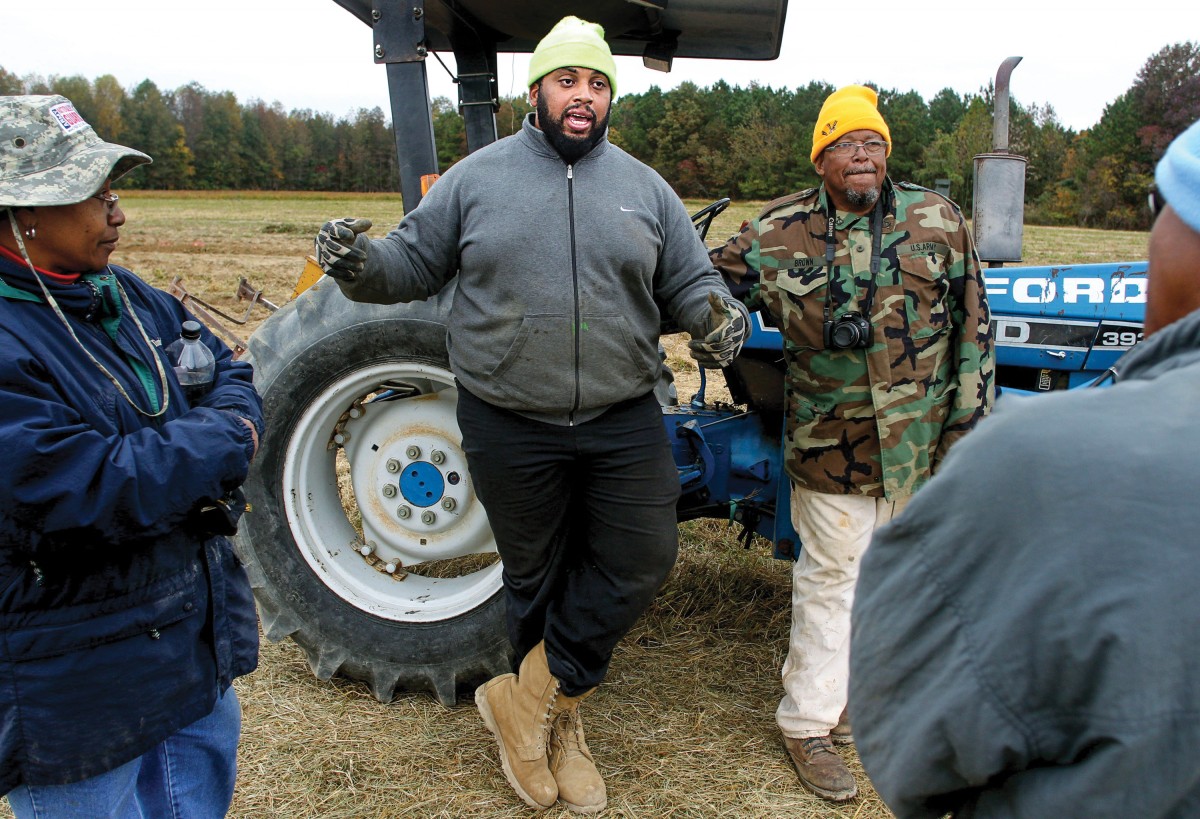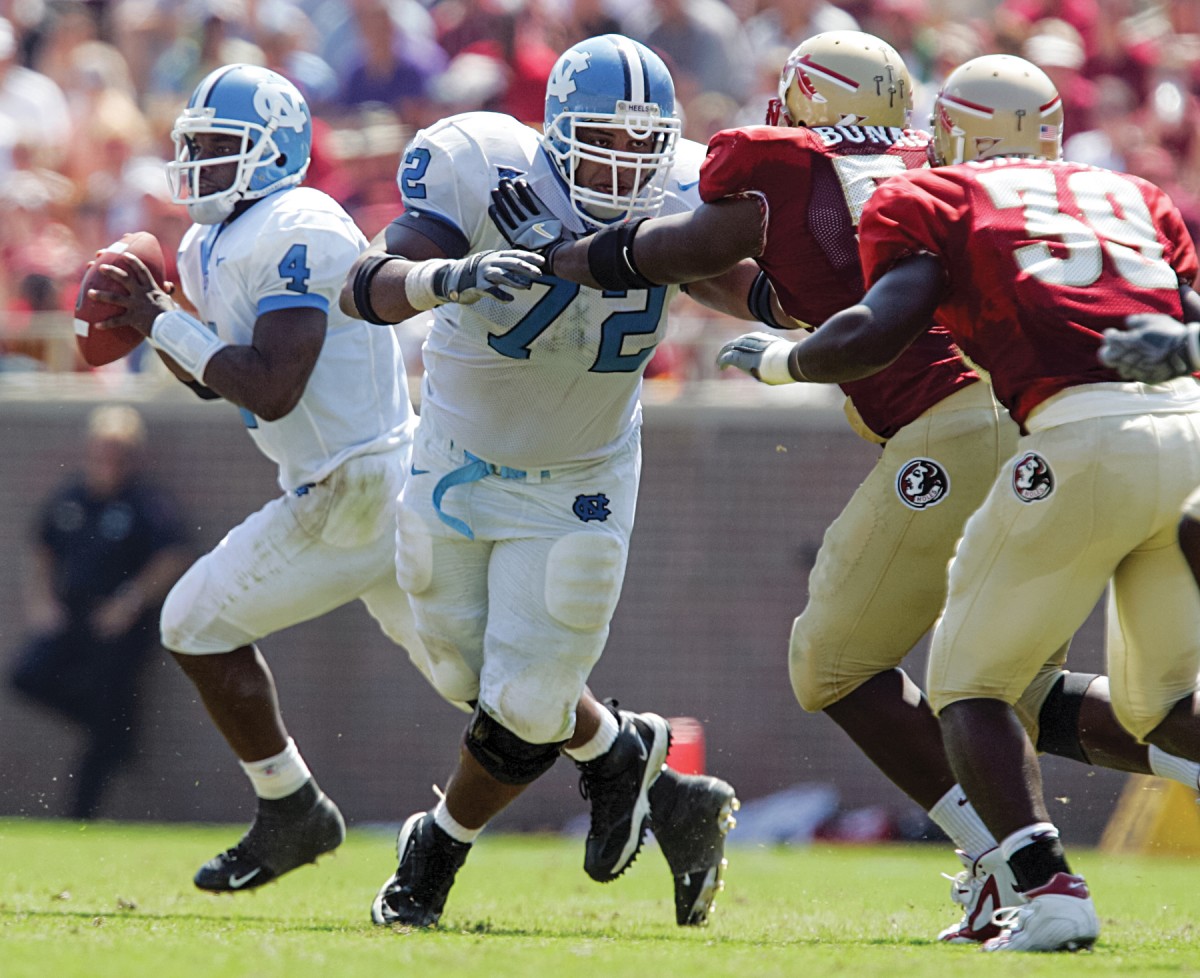The Best of the Harvest

Jason Brown ’05 won’t come off the field.
The first time the agricultural extension agent met her new neighbor — all 6-foot-3 and more than 300 pounds of him — he was surveying her 75 runaway goats, which had slipped through a hole in her fence in rural Franklin County for greener grass across the road. It was a cold, bundle-up sort of day just after Thanksgiving in 2013.
Martha Mobley had read about Jason Brown ’05, the Carolina and NFL star who’d been released by the St. Louis Rams the year before. Brown and his wife, Dr. Tay Brown ’09 (DDS), prayed about what they should do next. The answer surprised Brown: Not only should he become a farmer — he should give the harvest to the needy.
“Really?” he thought. “I don’t know anything about agriculture, doing it on a big scale.”
On that November day, Brown was driving nearby when he spotted Mobley’s goats. He started helping round them up, and Mobley was grateful, but little did she know that Brown’s generosity was just beginning to sprout.
Even before the Browns found the property — 1,000 acres dotted with silos, outbuildings and a long, low barn of white, peeling paint — they selected the name First Fruits Farm. They wanted to donate the first crop of every harvest.
Work clothes and camouflage-green rubber boots have replaced the uniforms of the Rams and the Baltimore Ravens. The Sunday football crowds are gone, substituted by the yapping of beagles and braying of three donkeys named Buster, Brenda and Bruno. Chickens peck in the yard around the two-story white clapboard house where last year Tay gave birth to their fourth child, a boy named Tre. Jason handled the delivery.

Jason Brown didn’t know anything about large-scale farming — only that he wanted to harvest for those less fortunate. This year, he is doubling his farm’s sweet potato crop to 10 acres, with a goal to harvest 250,000 pounds. “The best will be given away.” (Photo by Robert Willett/The News & Observer)
Football and farming — laboring and sweating on a field, the discipline, intense study. He had had a five-year, $37.5 million contact. He said his agent told him other teams wanted to sign him, for maybe another $20 million or so over the next few years.
“I said to myself, how much is enough? I didn’t want to make my decisions around money anymore. I didn’t want to make my decisions around being selfish anymore. I wanted to do what was best for my family, and I also wanted to lean back on my faith. My wife and I made a commitment that whatever is grown here on the farm, God’s people are going to receive the first fruits, not the leftovers or scraps. The best will be given away.”
Years before, he’d lost a footrace to his older brother, Lunsford Bernard Brown II, and he lashed out at him: “I’ve got a scholarship to play football at Carolina, and I’m going to do big things. What are you doing that’s so great with your life?” His brother would die in a mortar attack during the Iraq War, leaving behind his wife and a 3-month-old daughter he had never met.
Brown contemplated whether to extend his football career. “I looked in the mirror and posed the same question to myself: ‘What is it that you are doing that is so great right now?’ I know that having an NFL career for many people is an American dream, but at the same time for me it was a very selfish lifestyle, only benefiting myself and my family. I would like to start living a life of service, not just to my family but to everyone around me.”

Brown gives the Tar Heels pass protection against Florida State in 2004, the year he was first-team All-ACC. (The News & Observer file photo)

Brown played six years in the NFL for the Baltimore Ravens and St. Louis Rams. He once had a $37.5 million contract. “I didn’t want to make my decisions around money anymore.” (Getty Images)
This year, Brown is doubling his farm’s sweet potato crop to 10 acres, with a goal to harvest 250,000 pounds, highlighted by the gathering of 1,000 volunteers for a Great Harvest Festival on Nov. 7. He’s growing watermelons and sweet corn and making plans to start a community garden of 25 to 30 acres so that “people can come out and fill up their grocery bags full of vegetables.” He also is working with Feed America to deliver care packages to 8,000 military families along the East Coast.
“I can take not even half, not even a fraction of the credit for what’s going on,” Brown said. “God has sent some of the most awesome people my way to help me fulfill the great things that we are doing. That was always one of my big fears: I can’t do everything by myself, so who is going to help me?”
A summer ago, Louisburg farmer Len Wester actually did the work for Brown, planting five acres of sweet potatoes for donation. When Wester explained Brown’s mission to David and Allen Rose, brothers who farm in Nashville, they donated $5,000 worth of sweet potato slips.
“Jason admitted early on that he had never farmed,” Wester said. “He said he’d like to get into it a little bit and start growing things that would help the community. If Jason called me this morning and said he needed some help, I’d stop what I was doing and go help him. His heart is in the right place.”
Brown bought a new John Deere tractor earlier this year, replacing an old Ford with bad power steering. Wester says Brown “is determined to do it himself this year.”
Brown has attended agricultural extension classes on topics such as building high-roof greenhouses, while reading The Farmer’s Almanac for planting tips. He watches YouTube videos for instructions on harvesting sweet potatoes with a row-busting plow and germinating tiny tomato and green pepper seeds on a heating pad.

Jason Brown supervises the harvest of sweet potatoes for the needy in November last year at his First Fruits Farm near Louisburg, N.C. (Photo by Robert Willett/The News & Observer)
Last summer, he noticed that Wester’s crew had left cucumbers unpicked in the field. Wester explained that they were surplus beyond his contract to provide 35,000 bushels to the Mount Olive Pickle Co. Brown asked him for the leftovers.
Then from mid-July through mid-November, volunteers along with Brown, pregnant Tay and 2-year-old son Noah collected more than 62 tons of sweet potatoes and more than 4 tons of cucumbers. The Inner Faith Food Shuttle, the Food Bank of Eastern North Carolina and local churches and pantries distributed the food.
On his website, www.wisdomforlife.org, Brown is giving away vegetable seeds and soliciting donations to defray farm expenses. Financially, he says his efforts “eventually have to make sense. Right now I just find joy in helping and giving back.”
“The morals and ethics behind this farm are not driven by capitalism. It is about doing the right thing. I just don’t want to give food away. I want to empower our community and teach people about the joy of farming. If I continue to give food year after year, then I’m actually handicapping a lot of people out there. The Bible does call people to work hard. It says if you do not work, you don’t eat. Every man is called to action.”
— Chris Burritt ’81
Thanks for reading the Carolina Alumni Review
Carolina Alumni members, sign in to continue reading.
Not yet a member? Become one today.
